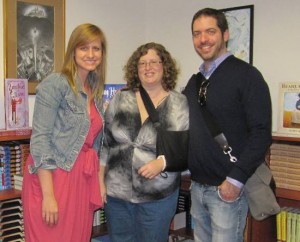I was thrilled by the response to my October 19th post, A Query Dissected, in which I shared the query letter that got me my agent and discussed some of the things I thought a query needed to be successful. But what if you are not quite there yet and don’t know which agents to approach? As difficult as writing a query letter was, I found searching for an agent to be even harder. How was I supposed to know which agents were reputable? How could I find out which ones represented my favorite authors? How would I know when I’d found the agent that was right for me?
And so I’ve decided to write about the part that came before the query: the hunt.
In general, you should be looking for an agent who:
- Represents the kind of book you have written
- Has a proven track record
- Has developed relationships with the publishers you think would be right for your book.
You should make sure they do not:
- Charge fees for reading, “administration,” editing or “agent evaluations.”
- Refer you to a vanity (or subsidy) publishing house under the guise of securing you a publishing contract.
- Use non-standard contracts that include language about claiming commissions on client’s future works
Making Your Long List
I started my research with two main resources:
www.agentquery.com
This is the best free resource I found for searching for an agent. Just check off the criteria you are looking for, say “YA” and “fantasy,” and you will find an up-to-date listing with contact information for all the agents who represent works that fall under those criteria.
www.scbwi.org
If you are already a SCBWI member, or if you are willing to pay the $85 fee to join, the SCBWI has a list of US agents who represent children’s authors and illustrators that is updated yearly.
Narrowing down your long list
Of course, this is just the beginning. Don’t scrawl off a list from agentquery and immediately start blasting off query letters. Not all agents are the same. Some take pride in the detailed critique letter they send their writers; some only wish to represent a work that is nearly perfect. Like everyone, they have their own tastes and prejudices. Your next step is to do some research into which agents on your long list would be right for you.
Sometimes this is simple. Some agents blog about themselves and list their clients on easily accessible websites. Others are cagier about themselves and who they represent.
My favorite methods for getting to know agents a little better were:
www.publishersmarketplace.com
I’ll admit it, at $20 a month, this one is an investment. When you are no longer looking for an agent, you can move down to the free “Publishers Lunch,” a daily digest of industry and book deal news, but while the hunt is on, I’d recommend buying the full package. Among many other perks, it will get you access to a searchable database of book deals where you can find out who’s making the big deals and who represents your favorite authors.
Acknowledgements
Most authors thank their agents in their acknowledgements, so this is a great way to find out who’s representing books like yours. You can also usually glean whether or not they really love their agent or whether the thanks are just perfunctory.
Chatting up authors
I’m a shy person, so going up to an author I didn’t know at a conference or event was sometimes difficult. I actually found that telling an author I was agent hunting and asking them about their agent or whether they had any advice was a good way to start a conversation.
It wasn’t long before I had a shortlist of agents I knew I was interested in showing my work to. In upcoming weeks, I will blog about submitting and the dreaded state of being “on sub” (If you are there right now, my sympathies!)
A few sections of this post were taken from an article I wrote for CANSCAIP NEWS. If you are a Canadian author or illustrator, or if you have a Canadian publisher, I highly recommend that you join this wonderful organization.






 Hi! I'm Lena, a young adult fantasy author from Toronto.
Hi! I'm Lena, a young adult fantasy author from Toronto.
The tip about chatting up other authors is never given. I think it’s the most crucial because you’ll get the inside scoop and a good feel for whether or not an agent is as good as they may appear on paper.
I’m out on sub now, and yes, it is a dreaded state :).
I absolutely agree, Isis. One of the most important things a new or aspiring author can do is start to develop a community of other authors and illustrators. There’s a huge knowledge base out there of lovely people who are usually only too happy to help and advise.
And best of luck on sub! XX (Those are two crossed fingers.)
Thank you, Lena, as always for sharing your experience. I’m so unschooled in this process so I need to ask what does “on sub” mean?
Rebecca
Hi Rebecca!
On sub= On submission, or in the process to submitting a manuscript to agents or editors. The highs, the lows, the requests, the rejections–it’s a crazy time!
Oh that’s what the craziness is called! Thank you.